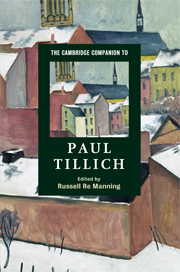Book contents
- Frontmatter
- Part I Standing within the theological circle
- Part II Theology of culture
- 8 Tillich’s analysis of the spiritual situation of his time(s)
- 9 Theology of culture and its future
- 10 Tillich’s theology of art
- 11 Tillich’s philosophy
- 12 Tillich’s ethics between politics and ontology
- 13 On the boundary of utopia and politics
- Part III Tillich in dialogue
- Bibliography
- Index
13 - On the boundary of utopia and politics
from Part II - Theology of culture
Published online by Cambridge University Press: 28 May 2009
- Frontmatter
- Part I Standing within the theological circle
- Part II Theology of culture
- 8 Tillich’s analysis of the spiritual situation of his time(s)
- 9 Theology of culture and its future
- 10 Tillich’s theology of art
- 11 Tillich’s philosophy
- 12 Tillich’s ethics between politics and ontology
- 13 On the boundary of utopia and politics
- Part III Tillich in dialogue
- Bibliography
- Index
Summary
Paul Tillich was one of the most significant political theologians of the twentieth century. Nonetheless, although he by no means abandoned politics after his emigration in 1933, he was clearly more comfortable with his activity in German politics than with his American political role. His politics, like his thought in general, was characterized by boldness and risk-taking. This boldness was partially due to the fact that he was more a person of theory than one of action, although his activity in politics was more considerable and sustained than most of his philosophical and theological contemporaries'. Tillich was not active in local politics, but he addressed politics at its highest levels in both countries. In 1951 he returned to Germany to present four lectures at the Deutsche Hochschule für Politik in Berlin; characteristically, he chose to lecture on the topic of utopia (PolE, 123-80). This chapter will take the theme of these lectures - the meaning of utopia - as a helpful starting place for an interpretation of Tillich's politics. Having set out the foundations of his political theory in terms of its simultaneous embrace and critique of the concept of utopia, this chapter will trace the development in Tillich's political commitment, from his youthful embrace of religious socialism following the First World War, his critical stance against National Socialism, his contributions to German politics from exile to his critical engagements with American political life in the 1950s and 1960s, to his mature reflections on the possibility of peace and the right to hope.
- Type
- Chapter
- Information
- The Cambridge Companion to Paul Tillich , pp. 208 - 220Publisher: Cambridge University PressPrint publication year: 2009
- 2
- Cited by

